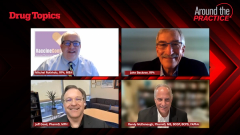
Mandates Contributing to Vaccine Hesitancy
Key opinion leaders explore the opportunities and implications of vaccine mandates as they relate to influenza vaccines.
Episodes in this series

Mitchel Rothholz, RPh, MBA: Prior to COVID-19, flu vaccination was mandated for a lot of individuals. Do you see that being impacted with the pushback against mandates? Do you see that being a barrier for getting folks to want to get their flu vaccine?
Randy McDonough, PharmD, MS, BCGP, BCPS, FAPhA: Yes, that was a huge thing with COVID-19. All the news reporters seem to always want to do an interview with me and ask, “What do you think about mandates?” My response to them was, “I don’t think mandates are the solution. But the solution is to make sure our public and other health care providers who maybe have some hesitancy are fully educated and informed and have good information on which to base those decisions, and making sure they have a full understanding and become informed consumers so that they can make a good, healthy decision.” From my perspective, seeing what happened with COVID-19, mandates push people away who otherwise might be a candidate.
John Beckner, RPh: Yes, I agree with Randy. By and large, people don’t like being told what to do, and it’s incumbent upon pharmacists as a trusted source of information to provide the education that people need to make good decisions about vaccines as opposed to being told what to do.
Jeff Goad, PharmD, MPH: Yes, mandates were rolled out interestingly across the country, from employers to universities to school districts. I probably best encapsulate it as, it’s mandated unless you don’t want it. It’s trying to say that you have to get the vaccine unless you opt out. It’s a middle ground between “we think you should get it” and “you have to get it.” It has actually translated into increased vaccinations. Because some people say, “It’s mandated and it’s more hassle to opt out of it. OK, I’ll just get the vaccine.” We used to call them fence-sitters, and now we call them vaccine hesitant. We were able to get those in. There’s some gray area in mandates that is working. But I completely agree that a complete mandate, like we did in California for health care workers with no exemptions, is a challenge to implement.
Mitchel Rothholz, RPh, MBA: For the flu vaccine, the mandates that were there before COVID-19 are still in place. As you said, it’s a challenge, but it’s also a driver for getting individuals to be vaccinated.
Randy McDonough, PharmD, MS, BCGP, BCPS, FAPhA: It’s interesting that you say that, because when people are talking about mandates, I say, “Flu vaccines and other vaccines have been mandated for a long time for my kid to get into schools.” This isn’t a new thing. It’s more about the safety of the public and trying to get people to understand that this isn’t something new that the government just instituted. This has been part of our society for a long time. I appreciate the comments that Jeff made about that.
Mitchel Rothholz, RPh, MBA: When we talk more about the flu vaccine, and we’ve gone through the experience of the vaccine fatigue going through COVID-19 and the concerns and hesitancy, besides not wanting to have something mandated on an individual, what do you think the hesitancy is going to be in regard to flu this season? As health care providers and part of the team, how can pharmacists help address some of those concerns? Whether it’s something we’ve seen in COVID-19 that may get carried over into influenza, what do you think we’re going to be experiencing this flu season in terms of hesitancy or trying to address the vaccine contemplators? They’re not antivaccine, they’re just not sure that they’re ready or wanting to get it.
John Beckner, RPh: There’s always been a certain degree of vaccine hesitancy. Over the last several years, that hesitancy has been impacted and probably increased by the very loud voices of the antivaxxers. It has primarily been directed to flu vaccine. Pharmacists have worked hard to help dispel some of the myths associated with that, that it isn’t effective, that you can get the flu from the flu vaccine, and so on. What has been different with COVID-19 [vaccines] is most of the hesitancy has been around safety concerns with the perceived rush to market of the vaccine and then all the political issues that have gone along with that.
Historical vaccine hesitancy, primarily with the flu vaccine, has been of a different type. From the impact that pharmacists have had from an educational standpoint, we’ve done a good job of increasing the rates of influenza vaccine in the senior population—present company included here—and the opportunity is going to be with the younger population. One of the concerns I have is that if the younger population, young adults and young parents, are reluctant to get the vaccine, that’s going to translate into their attitudes regarding their children. That’s a really important area for pharmacists to try to concentrate on.
Transcript edited for clarity.
Newsletter
Pharmacy practice is always changing. Stay ahead of the curve with the Drug Topics newsletter and get the latest drug information, industry trends, and patient care tips.




















